Top Rankings
Nah Tah Wahsh Public School Academy School District ranks among the top 20% of public school district in Michigan for:
Category
Attribute
Student Attention
Lowest student:teacher ratio (Top 1%)
For the 2025 school year, there is 1 public school serving 184 students in Nah Tah Wahsh Public School Academy School District. This district's average testing ranking is 3/10, which is in the bottom 50% of public schools in Michigan.
Public School in Nah Tah Wahsh Public School Academy School District have an average math proficiency score of 22% (versus the Michigan public school average of 34%), and reading proficiency score of 22% (versus the 46% statewide average).
Minority enrollment is 95% of the student body (majority American Indian), which is more than the Michigan public school average of 37% (majority Black).
Overview
This School District
This State (MI)
# Schools
1 School
3,509 Schools
# Students
184 Students
1,376,331 Students
# Teachers
21 Teachers
82,379 Teachers
Student : Teacher Ratio
9:1
9:1
District Rank
Nah Tah Wahsh Public School Academy School District, which is ranked within the bottom 50% of all 851 school districts in Michigan (based off of combined math and reading proficiency testing data) for the 2021-2022 school year.
The school district's graduation rate of 50% has stayed relatively flat over five school years.
Overall District Rank
#640 out of 866 school districts
(Bottom 50%)
(Bottom 50%)
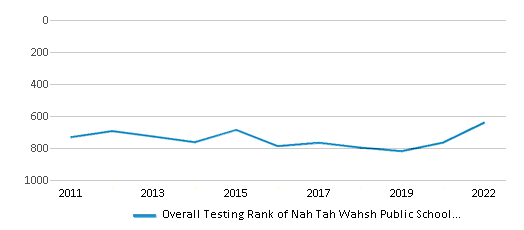
Math Test Scores (% Proficient)
20-24%
34%
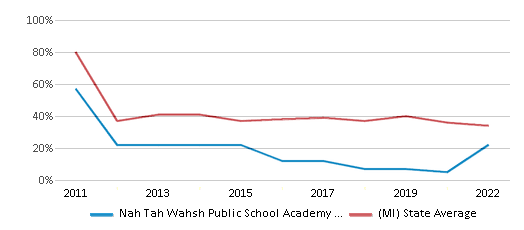
Reading/Language Arts Test Scores (% Proficient)
20-24%
45%
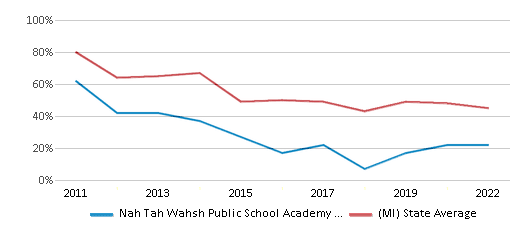
Science Test Scores (% Proficient)
11-19%
38%
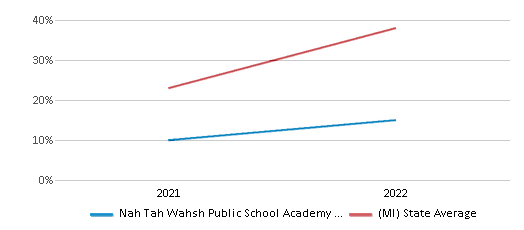
Graduation Rate
≥50%
81%
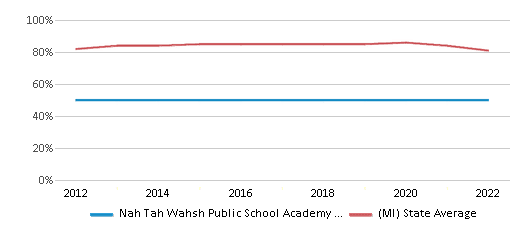
Students by Ethnicity:
Diversity Score
0.19
0.56
# American Indian Students
165 Students
8,574 Students
% American Indian Students
90%
1%
# Asian Students
1 Student
50,770 Students
% Asian Students
1%
4%
# Hispanic Students
2 Students
125,678 Students
% Hispanic Students
1%
9%
# Black Students
n/a
244,434 Students
% Black Students
n/a
18%
# White Students
10 Students
871,645 Students
% White Students
5%
63%
# Hawaiian Students
n/a
1,208 Students
% Hawaiian Students
n/a
n/a
# Two or more races Students
6 Students
73,219 Students
% of Two or more races Students
3%
5%
Students by Grade:
# Students in PK Grade:
-
-
# Students in K Grade:
19
110,461
# Students in 1st Grade:
17
100,790
# Students in 2nd Grade:
14
102,777
# Students in 3rd Grade:
14
100,401
# Students in 4th Grade:
12
101,847
# Students in 5th Grade:
11
101,136
# Students in 6th Grade:
12
102,120
# Students in 7th Grade:
12
103,285
# Students in 8th Grade:
11
102,692
# Students in 9th Grade:
13
114,669
# Students in 10th Grade:
19
112,993
# Students in 11th Grade:
19
109,871
# Students in 12th Grade:
11
109,317
# Ungraded Students:
-
3,972
District Revenue and Spending
The revenue/student of $21,016 is higher than the state median of $18,510. The school district revenue/student has grown by 13% over four school years.
The school district's spending/student of $17,082 is less than the state median of $17,693. The school district spending/student has grown by 13% over four school years.
Total Revenue
$4 MM
$25,476 MM
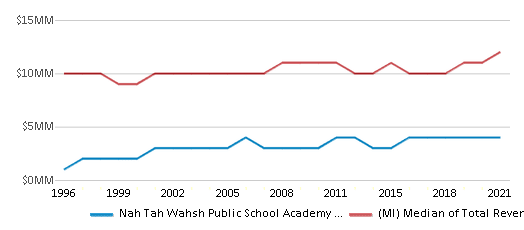
Spending
$3 MM
$24,351 MM
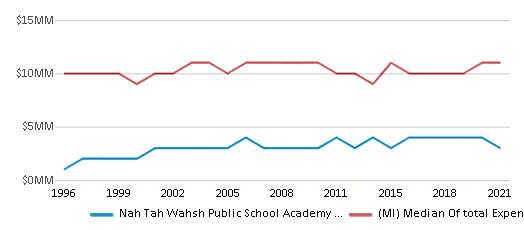
Revenue / Student
$21,016
$18,510
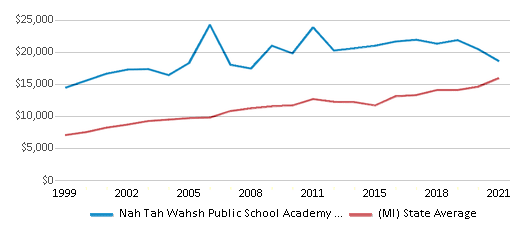
Spending / Student
$17,082
$17,693
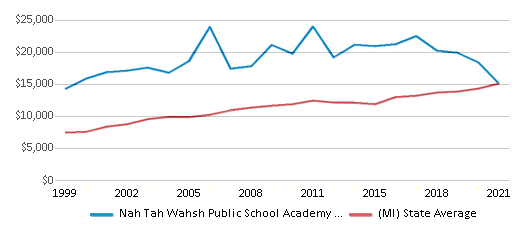
Best Nah Tah Wahsh Public School Academy School District Public Schools (2025)
School
(Math and Reading Proficiency)
(Math and Reading Proficiency)
Location
Grades
Students
Rank: #11.
Nah Tah Wahsh Public School Academy
Charter School
(Math: 20-24% | Reading: 20-24%)
Rank:
Rank:
3/
Bottom 50%10
14911 Hannahville B1 Rd
Wilson, MI 49896
(906) 466-2952
Wilson, MI 49896
(906) 466-2952
Grades: K-12
| 184 students
Frequently Asked Questions
How many schools belong to Nah Tah Wahsh Public School Academy School District?
Nah Tah Wahsh Public School Academy School District manages 1 public schools serving 184 students.
What is the rank of Nah Tah Wahsh Public School Academy School District?
Nah Tah Wahsh Public School Academy School District is ranked #638 out of 851 school districts in Michigan (bottom 50%) based off of combined math and reading proficiency testing data for the 2021-2022 school year. This district ranks in the top 20% of Michigan school districts for: Lowest student:teacher ratio (Top 1%)
What is the racial composition of students in Nah Tah Wahsh Public School Academy School District?
90% of Nah Tah Wahsh Public School Academy School District students are American Indian, 5% of students are White, 3% of students are Two or more races, 1% of students are Asian, and 1% of students are Hispanic.
What is the student/teacher ratio of Nah Tah Wahsh Public School Academy School District?
Nah Tah Wahsh Public School Academy School District has a student/teacher ratio of 9:1, which is lower than the Michigan state average of 17:1.
What is Nah Tah Wahsh Public School Academy School District's spending/student ratio?
The school district's spending/student of $17,082 is less than the state median of $17,693. The school district spending/student has grown by 13% over four school years.
Recent Articles

Sexual Harassment at Age 6: The Tale of a First Grade Suspension
A six-year old in Aurora, Colorado, was suspended after singing an LMFAO song to a little girl in his class and reportedly “shaking his booty.” We look at the case and the sexual harassment problem in public schools today.

How Scaffolding Could Change the Way Your Child Learns
This article explores the concept of instructional scaffolding, a teaching method that enhances learning by breaking down complex tasks into manageable parts. It highlights how scaffolding supports students in developing critical thinking skills and becoming more independent learners. The article discusses the benefits of scaffolding, including improved engagement and reduced anxiety, and provides strategies for its implementation across various educational levels.

February 05, 2025
Understanding the U.S. Department of Education: Structure, Impact, and EvolutionWe explore how the Department of Education shapes American education, from its cabinet-level leadership to its impact on millions of students, written for general audiences seeking clarity on this vital institution.





